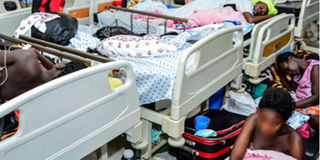Mentally ill mothers should be taken to hospitals, not prison- medic

Mothers under postnatal care at Kawempe Referral Hospital on August 23, 2016. Some new mothers experience mental health issues, prompting them to commit crime, a condition that Dr Nakku says should instead be handled by the hospital. PHOTO | FILE
What you need to know:
- She made the remarks in an interview with this reporter days after the World Health Organisation (WHO) on September 19 published the guide for integration of perinatal mental health in maternal and child health services.
The Executive Director of Butabika hospital, Dr Juliet Nakku, has implored security agencies to channel women and girls with signs of perinatal mental illness to hospitals not prison.
The first year post-delivery time, six to eight weeks after delivery, is the most risky time for mental health disorders in women, according to experts.
Some new mothers experience mental health issues, prompting them to commit crime, a condition that Dr Nakku says should instead be handled by the hospital.
“We get [attempted] suicide [cases] of mothers, we also see infanticides (killing a child below one year), and many of these women end up in prison here in Uganda, but we advocate that these women should actually be channeled into hospitals. It is not normal for a woman who has just had a baby to wake up and kill her baby,” Dr Nakku said.
She made the remarks in an interview with this reporter days after the World Health Organisation (WHO) on September 19 published the guide for integration of perinatal mental health in maternal and child health services. The guide indicated that almost one in five women will experience a mental health condition during pregnancy or in the year after birth.
She said these women at times end up in prison because their mental health challenges were not addressed early due to fear of being stigmatised.
Meanwhile, the prisons services spokesperson, Mr Frank Baine, said the few mentally ill women in their custody receive treatment and complicated health cases are referred to Butabika hospital. He said there are about 800 women with mental illness in their custody.
Mr Baine revealed that they were yet to expand their special ward at Butabika hospital as theirs currently houses about 15 patients.
Dr Nakku said the patients suffer depression, anxiety and severe mental health disorders such as psychosis.
She proposed that laws and policies should seek to help women who commit infanticides but not to further victimise them in prison cells.
“We need to design documentation processes that ensure that health workers are asking the right questions more so on depression because it is the commonest,’’ Dr Nakku said.





